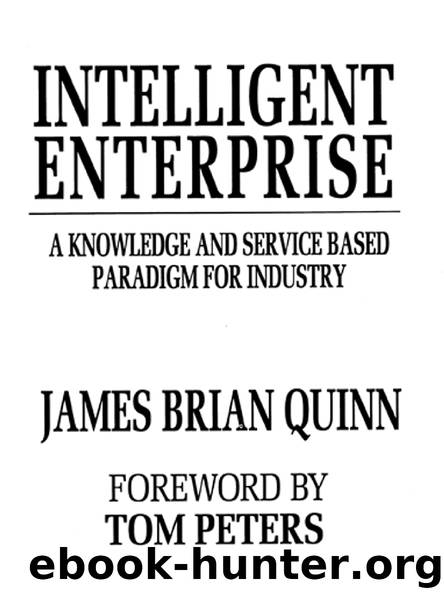INTELLIGENT ENTERPRISE by JAMES BRIAN QUINN

Author:JAMES BRIAN QUINN
Language: eng
Format: epub
Publisher: The Free Press
Published: 1992-07-15T00:00:00+00:00
FIGURE 7-3 Example: Activity Analysis Matrix—Support Activities versus Customer Needs, Large Business Segment
CONCLUSIONS
True focus in strategy means the capacity to bring more power to bear on a selected sector than anyone else can. While this once meant a manufacturer’s owning the largest production facility, research laboratories, or distribution channels supporting a single product line, this is no longer desirable or sufficient for most companies. Physical positions like a raw material source, a plant facility, or a product line rarely constitute a maintainable competitive edge today. This is especially true of manufactured products. They can be too easily bypassed, back-engineered, cloned, or slightly surpassed in performance. A truly maintainable competitive edge usually derives from developing depth in skill sets, experience factors, innovative capacities, know-how, market understanding, databases, or information-distribution systems—all knowledge-based service activities—that others cannot duplicate or exceed.
As a company does this it needs to concentrate on those particular skills, service activities, or knowledge elements in the value chain where the company is, can be, or must be “best in world” in order to have a competitive advantage its customers deem to be critical. The company must ensure that it is and remains measurably better in its selected core service activities, developing them in greater depth than anyone else can. Then it must seek to achieve at least parity—either internally or through external arrangements—in most other key elements of its value chain. In pursuing this parity, it must seek out, join with, purchase from, or try to match the best in world performance in each activity. Finally, it must surround its selected core competencies with defensive positions, both upstream and downstream, that keep existing or potential competitors from taking over or eroding its selected positions. As it moves toward such a posture, the company tends to become an “intelligent enterprise,” developing and coordinating intellectual activities worldwide.
Many companies fear that in following this approach they may not be able to maintain sufficient knowledge at the core to manage their specialist suppliers. This can be a real problem if not properly handled. To avoid losing control in the areas they outsource, successful companies maintain a small cadre of very specialized and talented managers at the top to oversee their outsourced relationships expertly. As later chapters will suggest, this often actually means upgrading the top line of people for their new activities. When this is done, despite some initial fears, many companies have found that their new activity coordinators, by riding circuit on all potentially “best in world” outside suppliers, can generate an even greater knowledge of the outsourced activities than the company had when its internal bureaucracies were producing these outputs on a proprietary basis. For example, as a portion of its Taurus/Sable project, Ford installed a “must see before” contracting policy, which forced its teams into the field to investigate alternate suppliers in detail. This led to greater understanding of suppliers and design problems, new ideas for the car, and a higher level of internal understanding about possibilities than the old processes allowed.
Download
This site does not store any files on its server. We only index and link to content provided by other sites. Please contact the content providers to delete copyright contents if any and email us, we'll remove relevant links or contents immediately.
Hit Refresh by Satya Nadella(9134)
The Compound Effect by Darren Hardy(8967)
Change Your Questions, Change Your Life by Marilee Adams(7781)
Nudge - Improving Decisions about Health, Wealth, and Happiness by Thaler Sunstein(7706)
The Black Swan by Nassim Nicholas Taleb(7129)
Deep Work by Cal Newport(7083)
Rich Dad Poor Dad by Robert T. Kiyosaki(6632)
Daring Greatly by Brene Brown(6513)
Principles: Life and Work by Ray Dalio(6447)
Playing to Win_ How Strategy Really Works by A.G. Lafley & Roger L. Martin(6305)
Man-made Catastrophes and Risk Information Concealment by Dmitry Chernov & Didier Sornette(6019)
Big Magic: Creative Living Beyond Fear by Elizabeth Gilbert(5771)
Digital Minimalism by Cal Newport;(5764)
The Myth of the Strong Leader by Archie Brown(5507)
The Slight Edge by Jeff Olson(5417)
Discipline Equals Freedom by Jocko Willink(5389)
The Motivation Myth by Jeff Haden(5212)
The Laws of Human Nature by Robert Greene(5208)
Stone's Rules by Roger Stone(5088)
